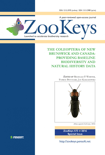
ZooKeys
Scope & Guideline
Illuminating the Path of Ecological Innovation.
Introduction
Aims and Scopes
- Biodiversity Research:
ZooKeys emphasizes the exploration and documentation of biodiversity, focusing on both known and unknown species across various taxonomic groups. - Taxonomic Revision and Description:
The journal publishes detailed taxonomic revisions, descriptions of new species, and keys for species identification, contributing significantly to the field of taxonomy. - Integrative Taxonomy:
Research often employs integrative taxonomy, which combines morphological, molecular, and ecological data to clarify species boundaries and relationships. - Geographical Focus:
While covering global biodiversity, there is a consistent emphasis on regions with rich biodiversity, such as tropical areas and specific countries like China and Brazil. - Ecological and Conservation Contexts:
Papers frequently address ecological and conservation issues, examining the implications of biodiversity loss and the importance of habitats.
Trending and Emerging
- Molecular Phylogenetics:
There is a growing trend in the use of molecular phylogenetics to resolve species relationships and improve taxonomic classifications, enhancing the understanding of evolutionary processes. - Cryptic Species Discovery:
Research focusing on the identification and description of cryptic species is on the rise, highlighting the hidden diversity within well-known taxa. - Integrative Approaches to Taxonomy:
An increasing number of studies are employing integrative approaches that combine molecular, morphological, and ecological data to provide a more comprehensive understanding of biodiversity. - Conservation Genetics:
The intersection of conservation biology and genetics is becoming more prominent, with studies focusing on genetic diversity and the conservation of endangered species. - Biogeographical Studies:
There is a notable increase in research examining biogeographical patterns and their implications for biodiversity conservation, particularly in biodiversity hotspots.
Declining or Waning
- Historical Taxonomic Studies:
There has been a noticeable decline in the number of papers dedicated to historical taxonomic studies, which may indicate a shift towards more contemporary biodiversity assessments. - General Faunistic Surveys:
While faunistic surveys remain important, the focus has shifted towards more specialized studies and integrative approaches, leading to fewer general surveys being published. - Morphological Studies in Isolation:
There appears to be a waning interest in purely morphological studies without accompanying molecular data, as integrative approaches gain favor in taxonomic research. - Paleontological Taxonomy:
Research related to paleontological taxa is becoming less frequent, possibly due to the increasing focus on recent biodiversity and conservation issues. - Non-Standardized Taxonomic Methods:
The trend towards standardized methods in taxonomy may be leading to a decline in the publication of studies that do not adhere to these emerging best practices.
Similar Journals
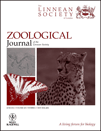
ZOOLOGICAL JOURNAL OF THE LINNEAN SOCIETY
Unraveling the complexities of animal behavior and systems.Zoological Journal of the Linnean Society, published by Oxford University Press, stands as a prestigious vessel for scholarly discourse in the fields of Animal Science and Ecology. With an ISSN of 0024-4082 and E-ISSN 1096-3642, this journal has an illustrious history dating back to its inception in 1866, and has consistently contributed groundbreaking research that shapes our understanding of zoology and evolutionary biology. Operating out of the United Kingdom, the journal boasts an impressive Q1 ranking in both Animal Science and Zoology and Ecology, Evolution, Behavior and Systematics, positioning it among the top tier of its category. With a significant presence in the academic landscape, the journal ranks 24th among 490 in Animal Science and 97th among 721 in Ecology, reflecting its impact and relevance in the field. Although it is not an open access journal, the wealth of knowledge it offers is invaluable for researchers, professionals, and students alike, aiding in the advancement of zoological sciences.

ACTA ENTOMOLOGICA MUSEI NATIONALIS PRAGAE
Charting New Territories in Ecology and EvolutionACTA ENTOMOLOGICA MUSEI NATIONALIS PRAGAE, published by the esteemed NARODNI MUZEUM - PRIRODOVECKE MUZEUM in the Czech Republic, is an influential journal in the fields of Ecology, Evolution, Behavior and Systematics, as well as Insect Science. With an ISSN of 0374-1036 and an E-ISSN of 1804-6487, this journal has established itself as a vital resource for researchers, professionals, and students interested in the intricate world of entomology. Spanning publications from 2005 to 2024, it is recognized for its contributions to the understanding of insect biology, offering insights on ecological interactions and evolutionary relationships. Although it operates as a subscription-based platform, the journal maintains a respectable presence in scholarly circles, positioned in the Q2 quartile for both relevant categories in 2023. ACTA ENTOMOLOGICA serves not only as a repository of significant empirical findings but also as a discourse platform for emerging entomological concepts, making it an essential read for those involved in the biological sciences.
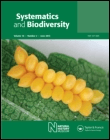
SYSTEMATICS AND BIODIVERSITY
Elevating the discourse in plant science and biodiversity studies.Systematics and Biodiversity, published by Taylor & Francis Ltd, is a prominent academic journal that provides a vital platform for advancing research in the fields of ecology, evolution, and plant science. With an ISSN of 1477-2000 and an E-ISSN of 1478-0933, the journal has established itself as a reputable source of scholarly information since its inception in 2003, and continues to publish cutting-edge studies through 2024. Recognized for its rigorous peer-review process, it holds a prestigious position in academic circles, reflected by its Q2 ranking in Ecology, Evolution, Behavior and Systematics and Q1 ranking in Plant Science as of 2023. The journal's contributions are further characterized by its strong performance in Scopus rankings, placing it in the 69th and 68th percentiles in its respective categories. Researchers, professionals, and students alike will find invaluable insights and innovative methodologies within its pages, making Systematics and Biodiversity an essential resource for those dedicated to understanding the complexities of biological diversity and systematics. The journal's impact factors and commitment to high-quality research underscore its significance in shaping the future of ecological and botanical studies.
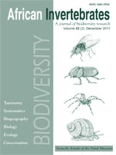
AFRICAN INVERTEBRATES
Unveiling the Secrets of African InvertebratesAFRICAN INVERTEBRATES is a distinguished open-access academic journal published by the COUNCIL NATAL MUSEUM, specializing in the study of invertebrate biology within the vibrant ecosystems of Africa. Operating since 2006, this journal has established itself as a vital resource in the fields of Animal Science, Ecology, Evolution, Behavior, Insect Science, and Paleontology, earning a strong Q2 ranking in these categories as of 2023. With its ISSN 1681-5556 and E-ISSN 2305-2562, the journal provides unrestricted access to cutting-edge research, fostering collaboration among global researchers and professionals. AFRICAN INVERTEBRATES serves not only as a platform for high-quality scholarly articles but also aims to enhance the understanding of Africa's unique invertebrate fauna and the ecological challenges they face. With a commitment to innovation and excellence, the journal is pivotal for those looking to contribute to the discourse surrounding African biodiversity and conservation strategies.
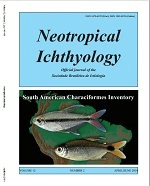
Neotropical Ichthyology
Fostering collaboration for the conservation of Neotropical fish.Neotropical Ichthyology is a prestigious open-access journal published by the SOC BRASILEIRA ICTIOLOGIA, dedicated to advancing the field of ichthyology within the Neotropical region. Since its inception in 2003, the journal has provided a vital platform for researchers, professionals, and students to disseminate significant findings related to fish biology, ecology, and conservation. With an impact factor that is reflected in its impressive Q1 ranking in Animal Science and Zoology and Q2 rankings in both Aquatic Science and Ecology, Evolution, Behavior and Systematics, it stands as a leading resource for cutting-edge research. Located in Brazil, at the UNIV SAO PAULO, the journal not only contributes to scientific knowledge but also fosters collaboration among ichthyologists dedicated to the rich aquatic biodiversity of the Neotropical region, ensuring that critical insights into fish species, habitats, and conservation strategies are accessible to a global audience.
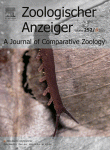
ZOOLOGISCHER ANZEIGER
Innovative Research for the Curious MindZoologischer Anzeiger is a prestigious peer-reviewed journal published by Elsevier GmbH in Germany, dedicated to advancing the fields of Animal Science and Zoology. With its consistent ranking in the Q1 category for both disciplines and a commendable Scopus rank of #165 out of 490, it stands out as a leading platform for innovative research and critical reviews in zoological sciences. The journal has been in continuous publication since 1961, navigating through different converged years, and remains a vital resource for researchers, professionals, and students aiming to deepen their knowledge and contribute to the dynamic field of zoology. Although it does not offer open access, the journal ensures that its content adheres to the highest standards of academic integrity and rigor, making it an essential read for anyone serious about animal biology and ecological studies. For research excellence and impactful scholarly discussions, Zoologischer Anzeiger is indispensable.
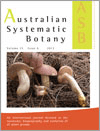
AUSTRALIAN SYSTEMATIC BOTANY
Pioneering Insights into Systematic BotanyAustralian Systematic Botany is a prestigious academic journal dedicated to the field of plant science, published by CSIRO PUBLISHING. Established in 1988, this journal has become a vital resource for researchers, professionals, and students focusing on the systematic study of Australian flora. With an impressive track record and convergence extending to 2024, it operates in the Q3 category for Ecology, Evolution, Behavior and Systematics and Q2 for Plant Science as of 2023. The journal holds significant value in the academic community, given its Scopus ranking, which places it in the 61st and 59th percentiles within its respective categories. Although it follows a subscription-based model, the journal remains committed to advancing knowledge in systematic botany, offering critical insights that shape the future of ecological and biological research both in Australia and globally.
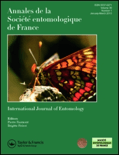
ANNALES DE LA SOCIETE ENTOMOLOGIQUE DE FRANCE
Celebrating the diversity and importance of insects.ANNALES DE LA SOCIETE ENTOMOLOGIQUE DE FRANCE, published by Taylor & Francis Ltd, is a prestigious journal that focuses on the dynamic field of entomology, offering a platform for the dissemination of innovative research related to insect science and ecological systems. With an increasing impact factor and notable quartile rankings (Q2 in both Ecology, Evolution, Behavior and Systematics, and Insect Science), the journal serves as a vital resource for researchers, professionals, and students alike, stimulating advances in our understanding of insect biology and its implications for broader ecological contexts. Although it is not an Open Access journal, it boasts a strong reputation within the academic community, as evidenced by its significant Scopus rankings and a commitment to high-quality peer-reviewed content. With its extensive historical archive since 1988 and a continuous publication schedule through 2024, ANNALES DE LA SOCIETE ENTOMOLOGIQUE DE FRANCE remains an essential reference for those engaged in the study of entomology and related ecological fields. For more information, visit the publisher's site at Taylor & Francis Ltd.
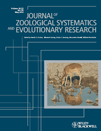
JOURNAL OF ZOOLOGICAL SYSTEMATICS AND EVOLUTIONARY RESEARCH
Transforming Insights into Evolutionary UnderstandingThe Journal of Zoological Systematics and Evolutionary Research, published by Wiley-Hindawi, stands as a premier academic journal since its establishment, showcasing cutting-edge research in the fields of Animal Science, Zoology, and Ecology. With an impressive track record spanning from 1963 to the present, this journal has earned a Q1 classification in both Animal Science and Ecology, as well as recognized rankings in Genetics and Molecular Biology. Its impact is highlighted by its Scopus ranks, placing it in the top percentile for relevant categories, underscoring its vital role in advancing knowledge and understanding within these disciplines. Researchers, professionals, and students will find a wealth of high-quality, peer-reviewed articles that contribute to the evolutionary understanding of biodiversity and systematics. Though not an Open Access journal, it remains accessible to a wide audience committed to exploring the intricacies of zoology and evolutionary biology.

Zoosystematics and Evolution
Transforming knowledge into impactful discoveries.Zoosystematics and Evolution is a premier peer-reviewed journal dedicated to the fields of animal science, zoology, and evolution, published by Pensoft Publishers. With a commendable Q1 ranking in multiple categories including Animal Science and Zoology, Ecology, Evolution, Behavior and Systematics, as well as Insect Science, this journal stands out as a vital resource for researchers and professionals engaged in the dynamic study of biodiversity and systematics. Since transitioning to Open Access in 2014, it has ensured that groundbreaking research is readily available to a global audience, thus fostering collaborative advancements and facilitating the dissemination of knowledge. The journal has a significant presence in both Scopus and various academic indices, enhancing its reputation and impact within the scientific community. Based in Bulgaria, at 12 Prof Georgi Zlatarski St, Sofia, the journal continues to thrive, contributing valuable insights that drive scientific inquiry and exploration in the ever-evolving realm of zoological research.